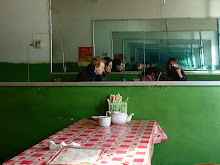
Photo by Fernando de Sousa entitled VIBGYOR, available under a Creative Commons Attribution-Share Alike 2.0 license.
Just had a quick flick through the Rainbow Guide, an orientation and pre-arrival handbook funded by the Australian Government through the Department of Education, Employment and Workplace Relations, International Quality Branch. The guide is available to download from the excellent International Education Association website ISANA. The Rainbow Guide is basically a template that can be adapted by all education providers throughout Australia in an effort to help student service professionals provide students with a thorough orientation to both their institution and life in Australia.
The AEI website describes it as a synthesis of orientation best practice and Soy Sauce was really impressed with both the presentation and the level of information that the document provides. Also, Soy Sauce is really supportive of this kind of top-down best-practice standardization. With all of the controversies late last year over dodgy education providers, moves from the DEEWR to provide leadership in areas such as pre-arrival and orientation will hopefully raise the level of service provided to all international students during the time leading up and immediately prior to their arrival in Australia.
One area that I find interesting especially in light of recent stories featured on Soy Sauce, is the section of the document covering permanent accommodation. There is a wealth of information and advice provided in relation to renting, all of it presented in clear and simple language. The section covers everything from information about bonds to advice on how to select suitable housemates. It also provides contact details for relevant bodies that can provide further help such as the Tenants Union of Victoria.
However, with the lack of rental properties available in cities such as Melbourne, the document inadvertently serves to highlight the fact that not all service providers have a dedicated accommodation service, and that despite this wealth of information, students face the difficult challenge of actually finding and negotiating a rental arrangement alone. Perhaps if institutions where required to assist students secure suitable accommodation for their first couple of months in their new city, then the depressing tales of students being forced into signing overpriced leases through non-mainstream providers might be less common. So, whilst this document is a great start, further work needs to be done to provide international students with support in securing permanent accommodation.





No comments:
Post a Comment